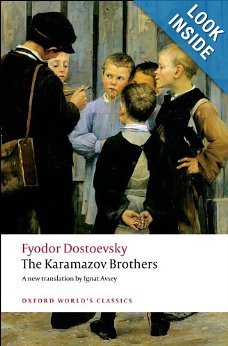“The Karamazov Brothers” by Fyodor Dostoevsky

Hey, y’all! Guess what I did this summer? I finished The Karamazov Brothers! And am feeling v. please w/self because of it.
What can I possibly write about The Karamazov Brothers by Fyodor Dostoevsky that doesn’t come across as hubris. This is one of the Great Books. But, as David Foster Wallace (RIP) noted in his essay on Dostoevsky that was collected in Consider the Lobster, approaching it as such can suck all the fun out of it. And it CAN be a fun book, As well as a moving book. And an engaging book. Which is why it’s come to be one of the Great Books.
Here are just a handful of reasons I’m glad I read it and would recommend it to just about everyone:
It’s perhaps the first police procedural. It centers on a murder, one that is described often for most of the book, but doesn’t actually take place until about 2/3 of the way through. But the clues, action, suspects, motivations, police work and trial are all detailed, often exhaustingly.
It’s funny. Too many examples to count, but one of my favorites was:
I must make an admission…I never could understand how it’s possible to love one’s neighbors. In my opinion, it is precisely one’s neighbors that one cannot possibly love. Perhaps if they weren’t so nigh…
It deals overtly with Theodicy, the study of the problem of pain in Christianity, or how can a benevolent God allow terrible things to happen.
As with the police procedural aspect, it is sometimes spookily modern:
the world is becoming more and more united, is being formed into brotherly communion, by the shortening of distances, by the transmitting of thoughts through the air. (313)
And perhaps, most of all, the teachings of Father Zosima, an elder, who speaks a passage quoted in both Harriet the Spy and Terence Malick’s To the Wonder,a character whose teachings changed Martin Sheen’s personal faith after Malick gave the book to him:
Love all God’s creation, the whole and every grain of sand in it. Love every leaf, every ray of God’s light. Love the animals, love the plants, love everything. If you love everything, you will perceive the divine mystery in things. Once you perceive it, you will begin to comprehend it better every day. And you will come at last to love the whole world with an all-embracing love.
I started reading the newest translation, the one by Pevear/Volkhonsky but switched to the Oxford World’s Classics (which have yet to let me down) version translated by Ivan Avsey, which I thought read much better in English. I did this as a summer reading project. The novel is divided into 13 books, ranging from about 20 pages to 100, (FD didn’t have the whole serialization thing nailed down, like Dickens, whom FD admired, did, with regular page counts ending on a cliffhanger.) so I read a section a week. Dividing it, and reading it with others, ensured that I finished. Otherwise, I would likely have given up during the third book, in a section called The Grand Inquisitor, which in retrospect is one of the more intriguing parts to the book. This would be a good book to read during winter.
Highly recommended. Not just because it’s Important. But because it’s GOOD.
August 31st, 2013 at 9:33 am
I read this one a long time ago, and The Grand Inquisitor section is the most memorable part for me. There are several books— The Brothers Karamazov, Dickens’ novels, Les Miserables, Tolstoy, etc.–that I would like to re-read someday. I read them so long ago, about 30 years ago, and I think I would get something different and more out of them a second time around. I tried with Les Miserables last year, but I didn’t get very far. I do believe my attention span has been shortened by the chaos of family life and by the Internet. Or are those just excuses?
August 31st, 2013 at 9:48 am
I am so daunted by this book. Thanks for suggesting a translator that you thought was readable. I do plan to give it a try SOMEDAY.
August 31st, 2013 at 1:15 pm
I’m really glad I read it, so thank you for choosing it. I even want to read more of his books now. Well, not right this minute. But you know what I mean.
August 31st, 2013 at 2:20 pm
Sherry, those aren’t excuses, those are TRUTH. My husband and I read Les Mis last year, together. The buddy system really helps to keep going. I started out with the unabridged translation in MMPB, but it was too small for my aging eyes, plus I didn’t like the translation. I switched to the Penguin one and fared much better. I flat out loved Bleak House when I read it last winter, and am doing a readalong this fall/winter of David Copperfield with Amy: http://www.newcenturyreading.com/2013/06/historic-london.html
I noticed a difference in then/now when I recently re-read The Screwtape Letters. I remembered it as a quick, funny read. I found it dark, depressing, and thorny this time–I think because I’ve lived long enough to recognize so much of the slippery behavior it details. And then, what a kick to read Karamazov, and there are at least TWO scenes in it that to me distinctly prefigured Lewis’ talking demon.
I can see going back to Grand Inquisitor and the readings of Father Zosima periodically through life now. This book is a keeper.